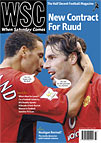 The falling cost of satellite technology has combined with an increase in broadcasts of live English games. Bruce Wilkinson examines modern football's global accessibility to televised matches
The falling cost of satellite technology has combined with an increase in broadcasts of live English games. Bruce Wilkinson examines modern football's global accessibility to televised matches
The international popularity of the Premiership has given rise to an ever growing demand for broadcasts of English football around the world. What began as a few Scandinavian countries beaming back live games has grown into scores of television companies from Los Angeles to Uzbekistan paying to show live transmissions, delayed broadcasts and highlights packages.
However, the falling cost of satellite technology in this country has combined with this increase in broadcasts of English games by foreign channels to produce a problem for the football authorities. This last bastion of non-football TV, designed by the Football Association and Football League to shore up Saturday afternoon attendances, is being breached all over the UK. It is now possible to access foreign broadcasts of live English games virtually every day of the week, crucially including Saturdays at 3pm. As an exiled Blackburn Rovers supporter living in Brighton over the past couple of years, I’ve been able to watch my team play live both on Sky and via Norwegian satellite TV in a couple of local pubs.
During the early days of the Premier League, many pubs latched on to the fact that they could access overseas coverage of English games. The only problem was that it breaches Sky’s agreement with the FA and the FA rule on not showing live games for two hours from 3pm on Saturdays. Sky’s lawyers leant on the authorities and the breweries to stamp it out and many pubs duly stopped under the threat of legal action. Now, however, falling costs of the equipment needed to receive the live feeds and the growing demand for live TV football have led to a huge increase in the number of places that show foreign satellite broadcasts.
There are several websites dedicated to sharing information about how to get hold of the equipment needed to receive the broadcasts and even some showing how to illegally hack into them. There are several towns in the north of England where virtually every pub with the facility to show Sky TV can now show the foreign coverage. The spread across the country seems to be uneven, possibly due to some brewery chains still being scared of receiving writs. Since December 2003, pubs in several parts of the country have begun to receive letters from the Premier League threatening legal action over the Saturday broadcasts. In south-east England many pubs have additionally been threatened with the loss of Sky football transmission rights. A website (www.knplogic. co.uk/sport), which deals in the equipment to show the matches and has a forum for those interested in the broadcasts, contains details of the legal threats that have been received. However, as many of the satellite feeds from around the world are free to air, it is unclear whether Sky or the FA are in a position to use the law to stop them being shown.
Meanwhile, the growth in pub numbers showing the satellite link continues. There is anecdotal evidence to suggest that a combination of rising ticket prices and the availability of Saturday afternoon broadcasts is even driving down attendances at certain clubs. It remains to be seen whether the growing tide of broadcasts will become too big to stop or will prompt a new clampdown on a far bigger scale. One thing is for certain: whether I watch Rovers from the stand, on the BBC or via Oslo, my team’s performances will still look just as useless.
From WSC 205 March 2004. What was happening this month